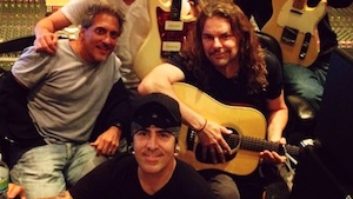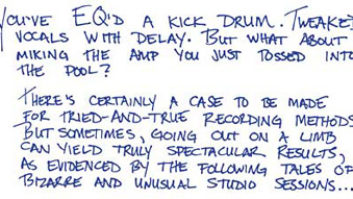It may be difficult to imagine a ukulele player from Oahu loosely modeling his music producing career after gangster rap’s überproducer, Dr. Dre, but Trey Terada, known to friends and fellow musicians as Dr. Trey (www.doctortrey.com), has blazed a unique path to establish his reputation as a producer/engineer. Terada challenges what is expected of him as a Hawaiian and a musician, working on Oahu with up-and-coming talent in the hopes of clinching recording deals outside of the island. His recent education via Berklee College of Music’s online program has allowed Terada to work in his homeland and collaborate with musicians worldwide.
After studying music at Arizona State University in the ’90s, Terada returned to Oahu. As his love for the recording process evolved, he taught music and opened his own studio, the Four Strings. Though the first incarnation of his studio in 1996 was created as an acoustical space for traditional Hawaiian stringed instruments and fitted with analog gear (including a Paris system), interest in digital technology and successful collaborations with one of his ukulele students, Jake Shimabukuro, gave Dr. Trey the impetus to redesign his studio, upgrade to digital gear and become formally educated in various digital systems. Shimabukuro, who is now one of Hawaii’s most popular artists, signed with Sony Music Japan International and has recently toured with banjo player Bćla Fleck.
The studio’s design and structural changes resulted from efforts by Terada and friend David Kawika Crowley, a longtime member of Hawaii’s music industry and a carpenter. The newly dubbed studio, The Doctor’s Office, is located in a commercial space in Kaneohe. The three-room facility comprises an iso booth, a tracking room and a control room — an intimate 800 square feet. As a producer, engineer and musician, Terada credits his classes at Berklee and his purchase of Pro Tools|HD4 Accel with “changing the game” for him. “The great thing about Berklee [is that] they’re offering stuff that I can’t get here [in Hawaii]. I’ve always wanted to go to Berklee as a musician or as an engineer, and the online program allowed me to [do that]. Because of Pro Tools, when I was in Japan recording one of Jake’s projects, I was able to bring a [Digi] 002 up there with me and turn the hotel into a classroom and recording studio.”
The studio features a Digidesign Command 8, Paris ProControl, Focusrite Control|24 and Mackie CFX 20 consoles. Terada’s room also contains an Mbox, which he uses as a mobile rig when needed. The studio relies on a carefully accumulated system of Mac G4s running Pro Tools, Live, Reason and Logic; Apogee converters (which Terada prefers); Tascam CDRW05000, DA-P1 and Roland VS-1680 recorders; speakers including Genelec 1032, Roland DS-90, and Yamaha MSP-5 and NS-10s, among others; and a Mesa Boogie dual-rectifier Blue Angel amp and Epifani 3×10 bass cabinets.
“I wanted to make sure that whatever I could offer would be the maximum amount that anyone would ever need,” he affirms. To that end, the studio also features high-end mics from Neumann, Royer, AKG, Audio-Technica and RØDE, and classic instruments to work with from Fender, Taylor, Martin and Koolau. A wide selection of plug-ins — from Crane Song to TL Labs — and virtual instruments Sound Scan, Ultra Focus, MachFive and Lounge Lizard round out the collection.
Terada recently produced the debut album for Hawaiian female hip hop musician, JRoq. “It’s a different vibe from most hip hop,” he says. “The greatest thing about living in Hawaii is that I can actually create and record music that’s inspired by paradise.” Terada’s continued involvement with Shimabukuro’s career and Sony Music Japan International brought a new level of notoriety to his production work and overall career: In 2003, Terada was named Hawaii Music Awards’ Producer of the Year for his contribution to Hawaii’s music community.
Terada has just begun to plan the path his work will take at The Doctor’s Office. And while that future will most likely involve the latest technology and developing and recording new artists, Terada seems happiest just considering the possibilities. “People seem to think that I have a signature sound, but I think that’s because they haven’t heard my other stuff yet,” he says with a laugh. “I don’t like to put myself in a niche. I would like to take it to the next level.”
Breean Lingle is Mix’s assistant editor.




